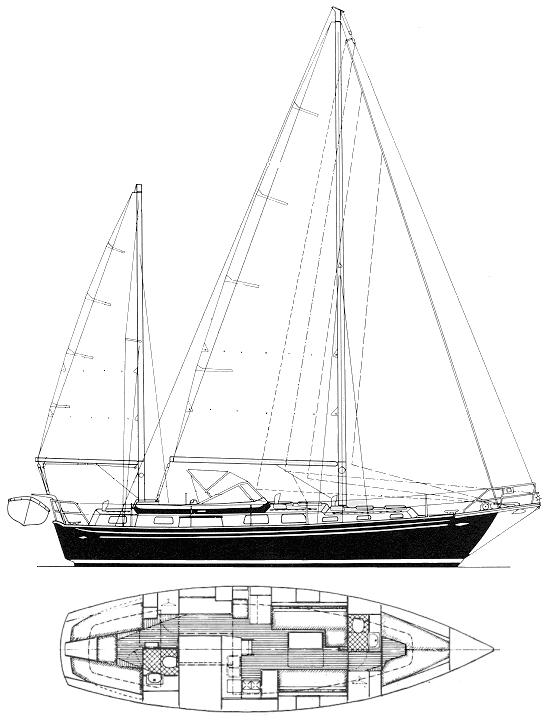The Hallberg-Rassy 41 is a celebrated bluewater cruising yacht, produced by the renowned Swedish builder Hallberg-Rassy between 1975 and 1981. Designed by the esteemed Swedish naval architect Olle Enderlein, this ketch-rigged vessel quickly established itself as a benchmark for long-distance cruisers, known for its robust construction, comfortable accommodations, and reliable sailing characteristics. With 105 units built, the HR 41 represents a significant step in Hallberg-Rassy's journey toward high-volume production of serious offshore yachts.
Hallberg-Rassy 41 Information, Review, Specs

- Make
- Hallberg-Rassy
- Model
- 41
- Number Built
- 105
- Production Year(s)
- 1975 - 1981
The creation of the Hallberg-Rassy 41 unfolded during a pivotal era for the builder. Hallberg-Rassy, formed in 1972 from the merger of Harry Hallberg's and Christoph Rassy's yards, was already gaining a reputation for producing high-quality fiberglass sailboats designed for serious cruising. Olle Enderlein, a prolific designer who shaped many of Hallberg-Rassy's early models, conceived the HR 41 as a successor to the popular Rasmus 35. It was designed to be a trendsetter, embodying the company's ethos of strength, safety, and comfort for challenging offshore conditions.
Hallberg-Rassy yachts of this period were characterized by robust construction, often featuring heavily built fiberglass hulls and an emphasis on durability. The HR 41 was a testament to this philosophy, built with a focus on providing a safe and reliable platform for extended voyages. While the builder's article mentions encapsulated keels on some models until 1984, the Hallberg-Rassy 41 featured a fin keel with a separated rudder, a design choice contributing to its handling characteristics.
Sailing Performance and Handling
The Hallberg-Rassy 41 is engineered for comfortable and capable offshore performance rather than outright speed. With a Sail Area to Displacement (SA/D) ratio of approximately 15.8, she is well-suited for moderate to strong winds, ensuring steady progress without being overly sensitive in lighter airs. Her Ballast to Displacement ratio of about 0.38 indicates a good level of stability, allowing her to stand up to a breeze and provide a comfortable motion in a seaway. The Displacement to Length (D/L) ratio of roughly 244 confirms her moderate-displacement cruising pedigree, balancing volume and load-carrying capacity with reasonable performance.
Owners and reviewers frequently commend the Hallberg-Rassy 41 for its reassuring and steady motion. The yacht is noted for its good directional stability, making for a less fatiguing experience on long passages. Handling is often described as impeccable, even in challenging conditions. The ketch rig offers significant flexibility in sail management, allowing for various sail combinations to adapt to different wind strengths and points of sail, enhancing both performance and ease of handling. The hull speed is approximately 7.83 knots.
Accommodations and Layout
Below deck, the Hallberg-Rassy 41 offers a practical and comfortable layout designed for extended living aboard. The interior is characterized by Hallberg-Rassy's exquisite Swedish craftsmanship, with high-quality mahogany and other fine woods creating warm and inviting living spaces, 14]. The design allows for free passage from stem to stern, contributing to a sense of spaciousness.
A common configuration features a two-cabin layout with a private master cabin aft and a large saloon. Impressive standing headroom is found throughout the interior, which enhances comfort, particularly for taller individuals. Typically, the layout includes two heads, a well-appointed galley, and ample storage for provisions and personal gear, making it highly functional for liveaboards and long-distance cruisers. The focus is on robust construction, quality accessories, and a handcrafted finish.
Owner's Perspectives
Owners of Hallberg-Rassy 41s consistently praise the yacht's solid construction and its ability to inspire confidence in demanding conditions, echoing the builder's reputation for creating genuine bluewater vessels. The insulated deck is often cited as a positive feature, effectively preventing condensation below, which is a significant comfort advantage in various climates. The comfort of the interior, with its practical two-cabin, two-head layout, is highly valued by those undertaking longer voyages or living aboard.
While Hallberg-Rassy yachts are generally known for their high quality, owners occasionally note that, like any vessel of its age, certain systems may require attention. For instance, the original Volvo Penta MD21A diesel engine, while reliable, can face increased load when powering numerous accessories like alternators, refrigeration compressors, or water makers, a common consideration for cruising boats. The active Hallberg-Rassy owner community provides a valuable resource for sharing experiences and advice on maintaining these classic cruisers, 21].
Measurements
Construction & Hull
- Construction Material
- Fiberglass (Solid)
- Hull Type
- Monohull Sailboat
- Keel Type
- Fin
- Rudder
- 1x —
- Ballast
- 8378 lbs
- Displacement
- 21825 lbs
- Water Capacity
- -
- Fuel Capacity
- -
Engine
- Engine Make
- Volvo Penta
- Engine Model
- MD21
- Engine Type
- —
- Engine HP
- —
- Engine Count
- 1
- Drive Type
- —
- Fuel Type
- Diesel
Rig & Sails
- Rig Type
- Ketch
- P (Main Luff)
- 44.5 ft
- E (Main Foot)
- 15.2 ft
- I (Foretriangle Height)
- 50 ft
- J (Foretriangle Base)
- 17.3 ft
- Forestay Length (est)
- 52.91 ft
- Main Sail Area
- 338.2 sqft
- Foretriangle Sail Area
- 432.5 sqft
- Total Sail Area (Reported)
- 771 sqft
- Total Sail Area (Calc)
- 770.7 sqft
Dimensions
- LOA
- 41 ft
- LWL
- 34.17 ft
- Beam
- 11.83 ft
- Draft
- 6.08 ft
- Max Headroom
- -
- Air Draft
- -
Calculations
- Hull Speed
- 7.83 kn
- Pounds per Inch Immersion
- 1